- Home
- Andrzej Sapkowski
Season of Storms Page 15
Season of Storms Read online
Page 15
Geralt saw another body; this one had been disembowelled and its guts pulled out. To their full length, or about two yards of the large bowel and over six of the small. The guts were stretched in a straight, shiny, greyish-pink line all the way to a shack of pine branches into which they vanished.
Inside the shelter, a slim man was lying on his back on a primitive pallet. It was clear at once that he was quite out of place there. His ornate clothing was completely covered in blood, soaked through. But the Witcher noticed it wasn’t squirting, gushing or dripping from any of the main blood vessels.
Geralt recognised him despite his face being covered in drying blood. It was that long-haired, slim, somewhat effeminate fop, Sorel Degerlund, introduced to him during the audience with Ortolan. At that time, he had also been wearing the same braided cloak and embroidered doublet as the other sorcerers, had been sitting among them and like the others had been observing the Witcher with barely concealed aversion. And now he was lying, unconscious, in a charcoal burner’s shack, covered in blood, with a human intestine coiled around his right wrist. Pulled from the belly of a corpse lying not ten paces away.
The Witcher swallowed. Shall I hack him to death, he thought, while he’s unconscious? Are Pinety and Tzara expecting that? Shall I kill the energumen? Eliminate the goetic practitioner who amuses himself by evoking demons?
A groan shook him out of his reflections. Sorel Degerlund, it appeared, was coming around. He jerked his head up, moaned, and then slumped back onto the pallet. He lifted himself up, looking vacantly around him. He saw the Witcher and opened his mouth, looked at his blood-spattered stomach and raised a hand. To see what he was holding. And began to scream.
Geralt looked at his sword, Dandelion’s purchase with the gilt cross guard. He looked at the sorcerer’s thin neck. At the swollen vein on it.
Sorel Degerlund unpeeled and stripped the intestine from his hand. He stopped screaming and just groaned, shaking. He got up, first onto his hands and knees and then onto his feet. He lurched out of the shelter, looked about him, shrieked and made to bolt. The Witcher grabbed him by the collar, set him in one place and pushed him down to his knees.
“What … has …” Degerlund mumbled, still shaking. “What … what happened … here?”
“I think you know.”
The sorcerer swallowed loudly.
“How … How did I end up here? Nothing … I don’t remember anything … I don’t remember anything. Nothing!”
“I don’t actually believe you.”
“The invocation …” Degerlund seized his face in his hands. “I invoked it … And it appeared. In the pentagram, in the chalk circle … And entered … Entered me.”
“Not for the first time, I imagine, eh?”
Degerlund sobbed. Somewhat theatrically, Geralt couldn’t help thinking. He regretted that he hadn’t surprised the energumen before the demon had abandoned him. His regret, he realised, wasn’t very rational. He was aware how dangerous a confrontation with a demon could be, and he should have been glad he’d avoided it. But he wasn’t glad. Because at least he would have known what to do.
It just had to happen to me, he thought. And not Frans Torquil and his troop. The constable wouldn’t have had any qualms or scruples. Bloodied, caught with the entrails of his victim in his fist, the sorcerer would have had a noose around his neck at once and would have been dangling from the handiest bough. Neither hesitations nor doubts would have held Torquil back. It wouldn’t have bothered Torquil that the effeminate and scrawny sorcerer was absolutely incapable of slaughtering so many people in such a short time that his blood-soaked clothing hasn’t managed to dry out or stiffen. And wouldn’t have been able to tear a child apart with his bare hands. No, Torquil wouldn’t have had any qualms.
But I do.
Pinety and Tzara were sure I wouldn’t.
“Don’t kill me …” Degerlund whined. “Don’t kill me, Witcher … I will never … Never more—”
“Shut up.”
“I swear I’ll never—”
“Shut up. Are you conscious enough to use magic? To summon the sorcerers from Rissberg here?”
“I have a sigil … I can … I can teleport myself to Rissberg.”
“Not alone. With me. And no tricks. Don’t try to stand up, stay on your knees.”
“I must stand up. And you … If the teleportation is to work, you must stand close to me. Very close.”
“Why exactly? Come on, what are you waiting for? Get that amulet out.”
“It’s not an amulet. I said, it’s a sigil.”
Degerlund undid his blood-soaked doublet and shirt. He had a tattoo on his skinny chest, two overlapping circles. The circles were dotted with points of various sizes. It looked a little like the diagram of the planets’ orbits that Geralt had once admired at the academy in Oxenfurt.
The sorcerer uttered a melodious spell. The circles shone blue, the points red. And began to rotate.
“Now. Stand close.”
“Close?”
“Still closer. Cling to me.”
“What?”
“Get in close and hug me.”
Degerlund’s voice had changed. His eyes, a moment before tearful, now lit up hideously and his lips contorted repugnantly.
“Yes, that’s right. Firmly and tenderly. As though I were your Yennefer.”
Geralt understood what was on the cards. But he didn’t manage to push Degerlund away, strike him with the pommel of his sword, or slash him across the neck with the blade. He was simply too slow.
An iridescent glow flashed in Geralt’s eyes. In a split second, he plunged into black nothingness. Into bitter cold, silence, amorphousness and timelessness.
They landed with a thud, the stone slabs of the floor seemingly leaping up to meet them. The impact threw them apart. Geralt was unable even to look around properly. An intense stench reached his nostrils, the odour of filth mixed with musk. Two sets of immense, mighty hands caught him under the arms and behind his head, fat fingers closed easily over his biceps, steely thumbs dug painfully into his nerves, into the brachial plexus. He went totally numb and his sword slipped from his inert hand.
He saw before him a hunchback with a hideous face covered in sores, his head dotted with sparse tufts of stiff hair. The hunchback, standing with his crooked legs wide apart, was pointing a large crossbow at him, or actually an arbalest with two steel bows one above the other. The two four-cornered bolts aimed at Geralt were a good two inches wide and razor-sharp.
Sorel Degerlund was standing in front of him.
“As you’ve probably realised,” he said, “you haven’t ended up at Rissberg. You’re in my asylum and lair. A place—about which the people at Rissberg know nothing—where I conduct experiments with my master. I am, as you probably know, Sorel Albert Amador Degerlund, magister magicus. I am, which you don’t know yet, he who will inflict pain and death on you.”
The feigned terror and simulated panic, all appearances, vanished as though blown away by the wind. Everything in the charcoal burners’ clearing had been feigned. A quite different Sorel Degerlund was standing before Geralt as he hung in the paralysing grip of those gnarled hands. A triumphant Sorel Degerlund, bursting with arrogance and hubris. Sorel Degerlund grinning a vicious smile. A smile calling to mind centipedes squeezing through gaps under doors. Disturbed graves. White maggots squirming in carrion. Fat horseflies wriggling their legs in a bowl of broth.
The sorcerer came closer. He was holding a steel syringe with a long needle.
“I deceived you like a child in the clearing,” he hissed. “You turned out to be as naive as a child. The Witcher Geralt of Rivia! Although his instinct didn’t mislead him he didn’t kill, because he wasn’t certain. For he’s a good witcher and a good man. Shall I tell you, good witcher, what good people are? They’re people whom fate hasn’t blessed with the chance of profiting from the benefits of being evil. Or alternatively people who were given a chance but were too stupid to ta
ke advantage of it. It doesn’t matter which group you belong to. You let yourself be tricked, you fell into a trap, and I guarantee that you won’t get out of it alive.”
He lifted the syringe. Geralt felt a prick and immediately acute pain. A stabbing pain that darkened his eyes, tensed his entire body, a pain so dreadful that only the greatest effort stopped him from screaming. His heart began to beat frantically and, compared to his usual pulse—four times slower than that of a normal person—it was an extremely unpleasant sensation. Everything went black, the world spun around, blurred and dissolved.
He was dragged away in the glow of magical balls dancing over the bare walls and ceilings. One of the walls he passed was covered in patches of blood and was hung with weapons. He saw broad, curved scimitars, huge sickles, gisarmes, battleaxes and morning stars. They were all streaked with blood. They were used in Yew Trees, Arches and Rogovizna, he thought lucidly. They were used to massacre the charcoal burners in Pinetops.
He had gone quite numb, had stopped feeling anything, he couldn’t even feel the crushing grip of the hands holding him.
“Buueh-hhhrrr-eeeehhh-bueeeeh! Bueeh-heeh!”
He didn’t realise at once that what he could hear was merry chuckling. Whoever was dragging him was clearly enjoying the situation.
The hunchback walking in front with the crossbow was whistling.
Geralt had almost lost consciousness.
He was shoved down roughly into an upright chair. He could finally see who was dragging him, crushing his armpits with their huge hands.
He remembered the giant ogre-dwarf Mikita, Pyral Pratt’s bodyguard. These two resembled him a little, they could just about have passed for close relatives. They were of similar height to Mikita, reeked similarly, like him had no neck, and like him their teeth protruded from their lower lips like wild boars’ tusks. Mikita was bald and bearded, however, while these two didn’t have beards. Their simian faces were covered in bristles and the tops of their egg-shaped heads were adorned with something like tousled oakum. Their eyes were small and bloodshot, their ears large, pointed and horribly hairy.
Their garb bore streaks of blood. And their breath stank as though they’d eaten nothing but garlic, shit and dead fish for many days.
“Bueeeeh! Bueeh-heeh-heeh!”
“Bue, Bang, enough laughter, get to work, both of you. Get out, Pastor. But stay close.”
The two giants went out, their great feet slapping. The hunchback addressed as “Pastor” hurried after them.
Sorel Degerlund appeared in the Witcher’s field of view. Scrubbed, hair combed, in fresh clothes and looking effeminate. He slid a chair closer, sat down, with a table piled with weighty tomes and grimoires behind him. He looked at the Witcher, grinning malevolently. At the same time he was playing with and swinging a medallion on a gold chain, which he was winding around a finger.
“I treated you to extract of white scorpion’s venom,” he said detachedly. “Nasty, isn’t it? Can’t move a hand, a leg; not even a finger? Can’t wink or even swallow? But that’s nothing. Uncontrollable movements of your eyeballs and disturbances to your sight will soon follow. Then you’ll feel cramps, really powerful cramps, they’ll probably strain your intercostal muscles. You won’t be able to control the grinding of your teeth, you’re certain to break a few. Then excessive salivation will occur and finally breathing difficulties. If I don’t give you the antidote, you’ll suffocate. But don’t worry, I shall. You’ll live, for now. But I think you’ll soon regret that you’ve survived. I’ll explain what it’s all about. We have time. But first I’d like to watch you turning blue.
“I was observing you on the last day of June, during the audience,” he continued a moment later. “You flaunted your arrogance before us. Before us, people a hundredfold your betters, people you’re no match for. Playing with fire amused and excited you, I saw that. It was then that I determined to prove to you that playing with fire will get you burnt, and interfering in matters of magic and mages has equally painful consequences. You’ll soon find out for yourself.”
Geralt tried to move, but couldn’t. His limbs and entire body were paralysed and insensitive. He felt an unpleasant tingling in his fingers and toes, his face was completely numb and his lips felt like they were laced together. His vision was deteriorating, his eyes were misting over and a cloudy mucus was gluing them together.
Degerlund crossed his legs and swung the medallion. There was a symbol on it, an emblem, in blue enamel. Geralt didn’t recognise it. His eyesight was getting worse. The sorcerer hadn’t lied, the disturbance to his sight was intensifying.
“The thing is, you see, that I plan to go far in the sorcerers’ hierarchy,” Degerlund continued casually. “In my designs and plans I’m relying on Ortolan, who’s known to you from your visit to Rissberg and the memorable audience.”
Geralt had the sensation that his tongue was swelling and filling his entire mouth. He was afraid it wasn’t just a sensation. The venom of the white scorpion was lethal. He’d never previously been exposed to its action and didn’t know how it might affect his witcher’s body. He was seriously worried, desperately fighting the toxin that was destroying him. The situation didn’t look good. It appeared he couldn’t expect help from anywhere.
“A few years ago,” said Sorel Degerlund, still delighting in the sound of his own voice, “I became Ortolan’s assistant. The Chapter assigned me to the post, and the Rissberg research team approved it. I was, like my predecessors, to spy on Ortolan and sabotage his more dangerous ideas. I didn’t owe my assignment merely to my magical talent, but also to my looks and personal charm. For the Chapter would supply the old man with the kind of assistants he was fond of.
“You may not know, but during the times of Ortolan’s youth, misogyny and the fashion for male friendship, which very often turned into something more—or even something much more—were rife among sorcerers. Thus it happened that a young pupil or novice didn’t have a choice, had to be obedient to his seniors in this regard, as with all others. Some of them didn’t like it very much, but had to take it as it came. And some acquired a liking for it. As you’ve probably guessed, Ortolan belonged to the latter. The boy, whose avian nickname fitted him then, became, after the experiences with his preceptor, a lifelong enthusiast and champion of noble male friendship and love—as poets would have it. It would be defined in prose more bluntly and crudely, as you know.”
A large black cat, with its tail fluffed up like a brush and purring loudly, rubbed itself against the sorcerer’s calf. Degerlund leaned over, stroked it and swung the medallion in front of it. The cat swatted the medallion casually with its paw. It turned away, signalling that the game was boring it, and set about licking the fur on its chest.
“As you’ve doubtless observed,” continued the sorcerer, “I have exceptional looks and women have been known to call me an ephebe. I’m fond of women, indeed, but in principle I didn’t and don’t have anything against homosexuality. Under one condition: if it is to be, it must help me to advance my career.
“My physical intimacy with Ortolan didn’t demand excessive sacrifices. The old man had long passed both the age limit for capability and desire. But I did my best for people to think otherwise and believe he’d utterly fallen for me. Believe there was nothing he would refuse his gorgeous lover. Believe that I knew his codes, that I had access to his secret books and notes. That he was giving me artefacts and talismans he hadn’t previously revealed to anyone. And that he was teaching me forbidden spells. Including goetia. And if previously the great men and women of Rissberg had disdained me, now they suddenly began to esteem me. I had grown in their eyes. They believed I was doing what they themselves dreamed of. And that I was achieving success.
“Do you know what transhumanism is? What kind of specialisation it is? Radiation speciation? Introgression? No? There’s nothing to be ashamed of. I don’t really either. But everybody thinks I know a great deal. That under the tutelage and auspices of Ortolan I’m
conducting research into perfecting the human race. With the lofty goal of refining and improving it. To improve the human condition, to eliminate illness and disability, to banish the ageing process, blah, blah, blah. For that is the goal and task of magic. To follow the path of the great masters: Malaspina, Alzur and Idarran. The masters of hybridisation, mutation and genetic modification.”
Announcing its arrival by meowing, the black cat appeared again. It jumped into the sorcerer’s lap, stretched and purred. Degerlund stroked it rhythmically. The cat purred even louder, extending claws of truly tiger-like proportions.
“You surely know what hybridisation is, for it’s another word for cross-breeding. The process of obtaining cross-breeds, hybrids, bastards—it’s all the same. They actively experiment with that at Rissberg, they’ve produced endless peculiarities, monsters and sports. Some find wide practical applications, like, for example, para-zeugles cleaning municipal dust heaps, para-woodpeckers keeping down tree parasites and mutated gambezis feeding on the larvae of malarial mosquitos. Or vigilosaurs, guard lizards the killing of which you bragged about during the audience. But they consider them trifles, by-products. What really interests them is the hybridisation and mutation of people and humanoids. That is forbidden, but Rissberg disregards prohibitions. And the Chapter turns a blind eye to it. Or, which is more likely, it remains immersed in blissful, dull ignorance.
“Malaspina, Alzur and Idarran, it has been proved, took small, ordinary creatures to their workshops to create giants from them, like those centipedes, spiders, koshcheys and the devils know what else. What then, they asked, stands in the way of taking an ordinary little man and transforming him into a titan, into somebody stronger, able to work twenty hours a day, who’s unaffected by illness, who can live fully fit to a hundred? It’s known that they wanted to do it. Apparently, they managed to, apparently they were successful. But they took the secret of their hybrids to the grave. Even Ortolan, who has devoted his life to studying their works, has achieved little. Bue and Bang, who dragged you here, have you observed them? They’re hybrids, magical crosses of ogres and trolls. The marksman Pastor? No, in fact he is, so to speak, in the likeness and image, the completely natural result of a cross between a hideous woman and an ugly man. But Bue and Bang, ha, they came straight out of Ortolan’s test tubes. You may ask: why the hell would anyone want such hideous creatures, what the hell would you create something like that for? Ha, I didn’t know that myself until quite recently. Until I saw how they ripped the woodcutters and charcoal burners apart. Bue is capable of wresting someone’s head from their shoulders with one tug, and Bang can tear a child apart like a roast chicken. And if you give them some sharp tools, ha! Then they can achieve a rip-roaring bloodbath. When you ask Ortolan he says that hybridisation is meant to be a way of eliminating hereditary illnesses, and witters on about increasing immunity to infectious diseases, or some such old fogey’s nonsense. I know better! And you do too. Specimens like Bue and Bang, and the thing you tore Idarran’s plate off, are only fit for one thing: killing. And that’s good, because what I needed were killing tools. I wasn’t certain about my own skills and capabilities in that regard. Unjustly, as a matter of fact, as it later transpired.

 something ends something begins sapkowski
something ends something begins sapkowski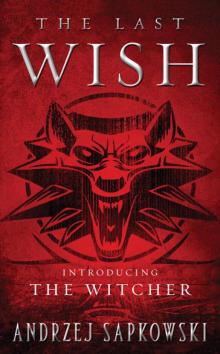 The Last Wish
The Last Wish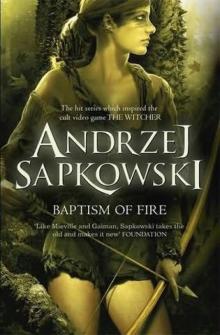 Baptism of Fire
Baptism of Fire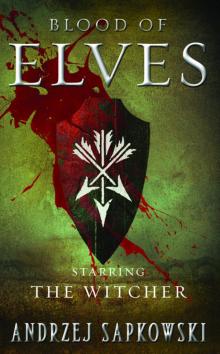 Blood of Elves
Blood of Elves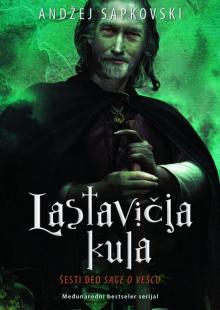 Lastavičja Kula
Lastavičja Kula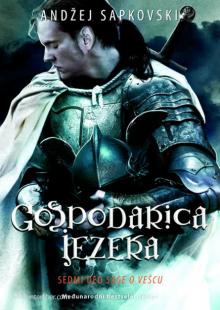 Gospodarica Jezera
Gospodarica Jezera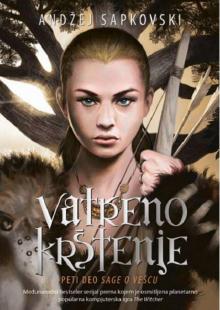 Vatreno Krštenje
Vatreno Krštenje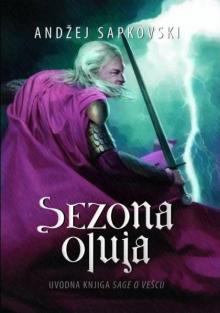 Sezona Oluja
Sezona Oluja Lady of the Lake
Lady of the Lake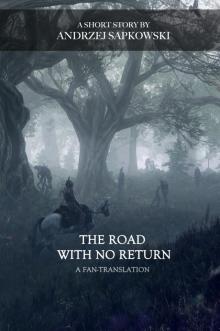 The Road With No Return
The Road With No Return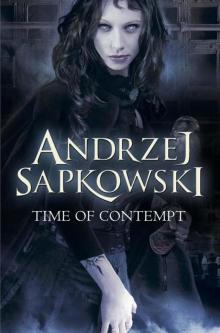 Time of Contempt
Time of Contempt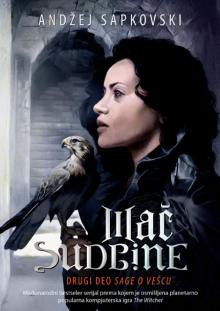 Mač Sudbine
Mač Sudbine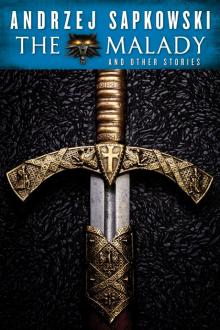 The Malady and Other Stories: An Andrzej Sapkowski Sampler
The Malady and Other Stories: An Andrzej Sapkowski Sampler The Saga of the Witcher
The Saga of the Witcher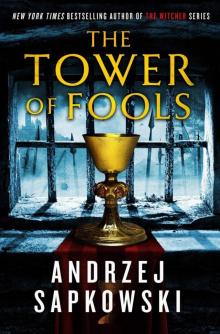 The Tower of Fools
The Tower of Fools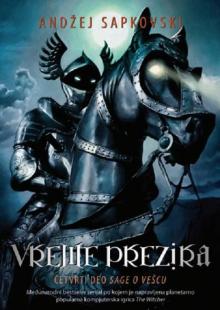 Vreme Prezira
Vreme Prezira Introducing the Witcher
Introducing the Witcher Stephen Hulin
Stephen Hulin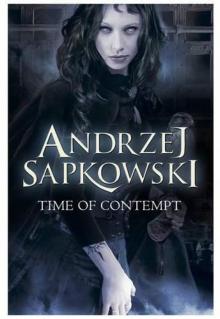 The Time of Contempt
The Time of Contempt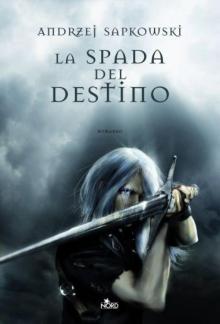 The Sword of Destiny
The Sword of Destiny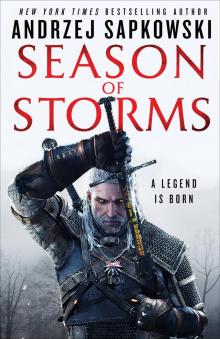 Season of Storms
Season of Storms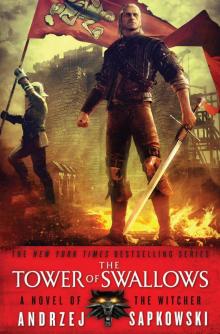 The Tower of Swallows
The Tower of Swallows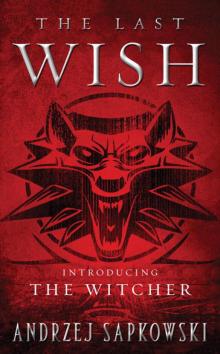 The Last Wish: Introducing The Witcher
The Last Wish: Introducing The Witcher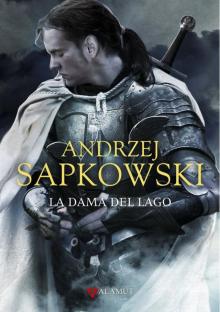 The Lady of the Lake
The Lady of the Lake